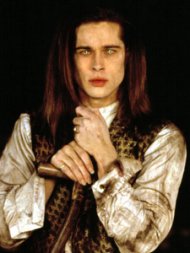
The first role that Brad Pitt won an award for, he hated.
Maybe hate is a strong word, but Pitt describes his experience as the brooding, self-loathing Louis de Pointe du Lac in the 1994 film “Interview with the Vampire: The Vampire Chronicles,” as “miserable.” In a nicely self-deprecating cover story for the September 23 Entertainment Weekly issue, the actor recalls his “six months in the (expletive) dark” wearing contact lenses, makeup, and playing second fiddle to star Tom Cruise both onscreen and off. (Cruise played the vampire Lestat.) “I’m telling you, one day it broke me,” Pitt tells EW, and confesses he called friend and producer David Geffen to see how much it would cost to get out. The sobering answer: $40 million. “I was like, ‘I’ve got to man up and ride through this….'”
Vampire model
One upside: Pitt got introduced to New Orleans, which would later become his adopted hometown that he would help to rebuild. And, miserable or not, a depressed vampire is still bragging rights for the twice-nominated Oscar actor: The role won him a double whammy at the MTV Movie Awards for best male performance and most desirable male.
Plus, all that silent suffering has been homework for other would-be vampires. Ethan Hawke studied Pitt to get the “self-loathing undead” vibe down for “Daybreakers” (2009). Colin Farrell, a newbie to the list of sexy cinematic bloodsuckers, came clean about his “soft spot for Brad Pitt in ‘Interview with the Vampire.'” (That’s right, soft spot.) And while Robert Pattinson has never mentioned Pitt as a brooding inspiration, the whippersnapper got beat out by his elder in at least one Hottest Vampire poll.
Earning his juice, stepping in for Heath
In the EW interview, the 47-year-old leading man also looks back on his career, reminiscing about people trying to shove him into the TV sitcom path (“I had that kind of Wonder Bread look and my hair was always went into place”), his “exhilaration” playing a hillbilly serial killer in “Kalifornia,” how he finally got to use his star “juice” in “Se7en” (“I will do it on one condition — the head stays in the box”), and the Oklahoma/Missouri creed (“Don’t believe your own hype”).
Pitt also talks about the “Tree of Life” role that Heath Ledger had accepted — and rejected — before he died. (Creepily, Ledger said in an interview, “I do the Terrence Malick movie right after that, ‘Tree of Life,’ and then I’ll drop to the ground, dead, for a year and hibernate.” ) While Pitt doesn’t explain why Ledger passed on the role, he does say, “I think he had other other things he was dealing with at that time and didn’t feel it was right for him, which I understand.” Ledger’s death reminded Pitt of a “dark moment on ‘Vampire,'” when River Phoenix died the week before he was to film his role as the journalist Daniel Malloy. Christian Slater replaced the talented actor, who had died of a drug overdose.
“Moneyball” in Pitt’s court
Pitt’s chatty, of course, because of his new film, “Moneyball,” based on the Michael Lewis book about Oakland A’s manager Billy Beane using stats instead of cash to assemble a winning team. Some have wondered if the sports team’s current losing records might hurt box-office dollars. So far, the Pitt appeal seems to be strong, with steady online buzz and good reviews. And, after all, misery loves company.
